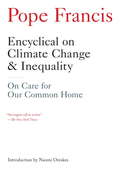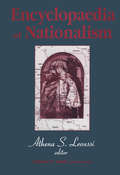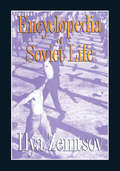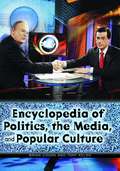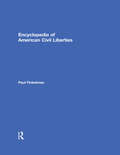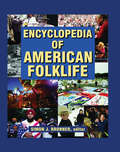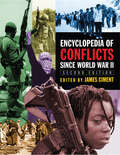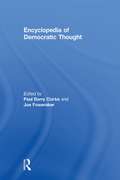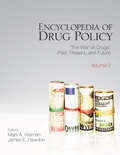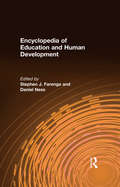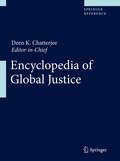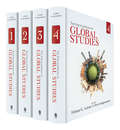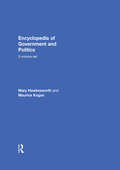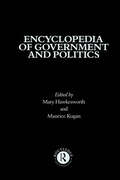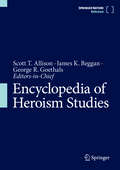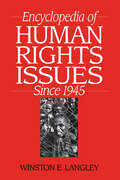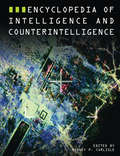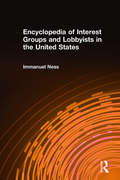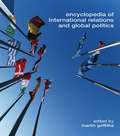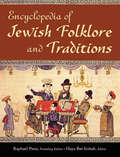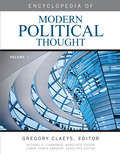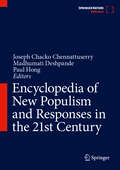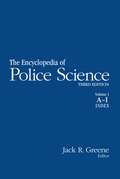- Table View
- List View
Encyclical on Climate Change and Inequality
by Pope Francis Naomi OreskesThe complete text of the landmark encyclical letter from Pope Francis that, as Time magazine reported, "rocked the international community"In the Encyclical on Climate Change and Inequality, the beloved Pope exhorts the world to combat environmental degradation and its impact on the poor. In a stirring, clarion call that is not merely aimed at Catholic readers but rather at a wide, lay audience, the Pope cites the overwhelming scientific evidence of climate change, and does not hesitate to detail how it is the result of a historic level of unequal distribution of wealth.It is, in short, as the New York Times labeled it, "An urgent call to action . . . intended to persuade followers around the world to change their behavior, in hopes of protecting a fragile planet." With an insightful and informative introduction by Harvard professor Naomi Oreskes, famed for her bestselling Merchants of Doubt: How a Handful of Scientists Obscured the Truth on Issues from Tobacco Smoke to Global Warming.From the Trade Paperback edition.
Encyclopaedia of Nationalism (Ssez -wiley Blackwell Encyclopedias In Social Sciences Ser.)
by Athena LeoussiSince the end of the internationalist Soviet experiment in 1989, nationalism is now recognized as a positive, vital force in modern political, cultural, and social life-if kept in check from excess. As a result of the explosion of nationalism, there has been a veritable resurgence of nationalism studies. This proliferation calls for a survey of instruments which have been developed by scholars for the study of nationalism. The Encyclopaedia of Nationalism brings together leading scholars in nationalism studies to survey this complex phenomenon.With over one hundred entries the Encyclopaedia of Nationalism offers a complete and concise set of tools for the study of nationalism in a single volume. The focus throughout is theoretical, and for this reason particular nationalist movements and individual leaders are treated only as illustrative historical and contemporary cases in numerous entries. The Encyclopaedia is organized in an alphabetical sequence of entries, each of which includes a short bibliography for further reading. The reader will find in-depth discussions of the work of modern theoreticians of nationalism.The defining figures of the eighteenth and nineteenth centuries including Herder, Rousseau, Fichte, Marx, and Renan. Conceptual entries, are treated historically and sociologically. Crucial influential ideas and phenomena that continually redefine themselves with changing historical circumstances, among them, anti-Semitism, art and nationalism, assimilation, class and nation, decolonization, ethnic competition, genocide, language and nation, multiculturalism, religion and nation, state and nation, and xenophobia are treated in depth. A special attraction of this volume is its essay-long entries, many of which have been written by the scholars who developed them.The Encyclopaedia of Nationalism discusses in lucid terms, from an interdisciplinary perspective, the central issues, debates, concepts, and theories available to students and scholars of nationalism. As such it is the most comprehensive and authoritative guide to the subject in all its varied manifestations and implications. It will be an essential tool for historians, political scientists, sociologists, and scholars of the history of ideas.
Encyclopaedia of Soviet Life
by Ilya ZemtsovA by-product of the amazing changes now taking place within the Soviet Union is a change in rhetoric no less than reality. Under Gorbachev, the Russian language has been changing parallel with novoe politichaskoe myshenie - new political thinking - with the effect that such new expressions as have flooded the Russian language clash with the less yielding realities of Soviet economy and society.The purpose of this volume is to clarify this dynamic in Soviet life, in which stagnation and decay confront hopes and expectations for liberalization. Zemtsov argues that the Soviet political language is self-contradictory, fractured into polarities of good and evil and thus depriving the Russian language of its basic subtlety, coherence, and inner logic.This work brings to life the Orwellian world of double-speak in a post-totalitarian environment. The Soviet language has two basic components: fictions which Communist ideology proclaims as reality, and realities that are portrayed in the guise of fictions. In this sense, Zemtsov undertakes to do for the Soviet language what the great H. L. Mencken achieved for the American language -show the reality of Soviet life by making plain the fictive qualities of Soviet ideology.This is a basic library reference work, a volume of indispensable utility for political scientists, area experts, and policy analysts. It offers a taxonomy enriched by a deep, personal knowledge of the Russian language by its author. Encyclopedia of Soviet Life is at one and the same time a basic primer of Soviet contemporary politics, a deep portrait of the psychology of totalitarian manipulation, and a sensitive appreciation of the nobler aspirations of the Russian people that is part and parcel of their great language.
Encyclopedia Of Politics, The Media, And Popular Culture
by Tony Kelso Brian A. CoganMedia in this country has helped shaped culture, which has affected politics, which in turn has influenced how those same media behave. The inter-relatedness of these societal elements is distinctive. Part I of this book is thematically organized by chapter examining these relationships from both a historical and contemporary perspective. Part II presented alphabetically arranged entries for people, programs, and events related to these subjects. The book succeeds at being a handy reference work, or just a fun volume to peruse. Annotation c2010 Book News, Inc., Portland, OR (booknews.com)
Encyclopedia of American Civil Liberties: Volumes A-z
by Paul FinkelmanThis Encyclopedia on American history and law is the first devoted to examining the issues of civil liberties and their relevance to major current events while providing a historical context and a philosophical discussion of the evolution of civil liberties. Coverage includes the traditional civil liberties: freedom of speech, press, religion, assembly, and petition. In addition, it also covers concerns such as privacy, the rights of the accused, and national security. Alphabetically organized for ease of access, the articles range in length from 250 words for a brief biography to 5,000 words for in-depth analyses. Entries are organized around the following themes: organizations and government bodies legislation and legislative action, statutes, and acts historical overviews biographies cases themes, issues, concepts, and events. The Encyclopedia of American Civil Liberties is an essential reference for students and researchers as well as for the general reader to help better understand the world we live in today.
Encyclopedia of American Folklife: Communities, Cultures, And Identity Groups (Encyclopedia Of American Folklife Ser.)
by Simon J BronnerAmerican folklife is steeped in world cultures, or invented as new culture, always evolving, yet often practiced as it was created many years or even centuries ago. This fascinating encyclopedia explores the rich and varied cultural traditions of folklife in America - from barn raisings to the Internet, tattoos, and Zydeco - through expressions that include ritual, custom, crafts, architecture, food, clothing, and art. Featuring more than 350 A-Z entries, "Encyclopedia of American Folklife" is wide-ranging and inclusive. Entries cover major cities and urban centers; new and established immigrant groups as well as native Americans; American territories, such as Guam and Samoa; major issues, such as education and intellectual property; and expressions of material culture, such as homes, dress, food, and crafts. This encyclopedia covers notable folklife areas as well as general regional categories. It addresses religious groups (reflecting diversity within groups such as the Amish and the Jews), age groups (both old age and youth gangs), and contemporary folk groups (skateboarders and psychobillies) - placing all of them in the vivid tapestry of folklife in America. In addition, this resource offers useful insights on folklife concepts through entries such as "community and group" and "tradition and culture." The set also features complete indexes in each volume, as well as a bibliography for further research.
Encyclopedia of Conflicts Since World War II
by James CimentThoroughly revised to include 25 conflicts not covered in the previous edition, as well as expanded and updated information on previous coverage, this illustrated reference presents descriptions and analyses of more than 170 significant post-World War II conflicts around the globe. Organized by region for ease of access, "Encyclopedia of Conflicts Since World War II, Second Edition" provides clear, in-depth explanations of events not covered in such detail in any other reference source. Including more than 180 detailed maps and 150 photos, the set highlights the conflicts that dominate today's headlines and the events that changed the course of late twentieth-century history.
Encyclopedia of Democratic Thought
by Paul Barry Clarke Joe FowerakerContaining almost 200 entries from 'accountability' to the 'Westminster model' the Encyclopedia of Democratic Thought explores all the ideas that matter to democracy past, present and future. It is destined to become the first port-of-call for all students, teachers and researchers of political science interested in democratic ideas, democratic practice, and the quality of democratic governance. The Encyclopedia provides extensive coverage of all the key concepts of democratic thought written by a stellar team of distinguished international contributors. The Encyclopedia draws on every tradition of democratic thought, as well as developing new thinking, in order to provide full coverage of the key democratic concepts and engage with their practical implications for the conduct of democratic politics in the world today. In this way, it brings every kind of democratic thinking to bear on the challenges facing contemporary democracies and on the possibilities of the democratic future. The Encyclopedia is global in scope and responds in detail to the democratic revolution of recent decades. Referring both to the established democratic states of Western Europe, North America and Australasia, and to the recent democracies of Latin America, Eastern and Central Europe, Africa and Asia, classical democratic concerns are related to new democracies, and to important changes in the older democracies. Supplemented by full bibliographical information, extensive cross-referencing and suggestions for further reading, the Encyclopedia of Democratic Thought is a unique work of reference combining the expertise of many of the world's leading political scientists, political sociologists and political philosophers. It will be welcomed as an essential resource for both teaching and for independent study, and as a solid starting point both for further research and wider exploration.
Encyclopedia of Drug Policy
by Mark A. Kleiman James E. HawdonRequest a free 30-day online trial to this title at www.sagepub.com/freetrial!Spanning two volumes of approximately 450 entries in an A-to-Z format, this encyclopedia explores the controversial drug war through the lens of varied disciplines. A full spectrum of articles explains topics from Colombian cartels and Mexican kingpins to television reportage; from "just say no" advertising to heroin production; and from narco-terrorism to more than $500 billion in U.S. government expenditures.Key Themes- Cases- Conferences and Conventions- Countries (Affecting U.S. Drug Policy)- Drug Trade and Trafficking- Laws and Policies- Organizations and Agencies- People-Presidential Administrations- Treatment and Addiction- Types of Drugs
Encyclopedia of Education and Human Development
by Daniel Ness Stephen J. FarengaThis comprehensive and exhaustive reference work on the subject of education from the primary grades through higher education combines educational theory with practice, making it a unique contribution to the educational reference market. Issues related to human development and learning are examined by individuals whose specializations are in diverse areas including education, psychology, sociology, philosophy, law, and medicine. The book focuses on important themes in education and human development. Authors consider each entry from the perspective of its social and political conditions as well as historical underpinnings. The book also explores the people whose contributions have played a seminal role in the shaping of educational ideas, institutions, and organizations, and includes entries on these institutions and organizations. This work integrates numerous theoretical frameworks with field based applications from many areas in educational research.
Encyclopedia of Global Justice
by Deen K. ChatterjeeThis two-volume Encyclopedia of Global Justice, published by Springer, along with Springer's book series, Studies in Global Justice, is a major publication venture toward a comprehensive coverage of this timely topic. The Encyclopedia is an international, interdisciplinary, and collaborative project, spanning all the relevant areas of scholarship related to issues of global justice, and edited and advised by leading scholars from around the world. The wide-ranging entries present the latest ideas on this complex subject by authors who are at the cutting edge of inquiry. The Encyclopedia sets the tone and direction of this increasingly important area of scholarship for years to come. The entries number around 500 and consist of essays of 300 to 5000 words. The inclusion and length of entries are based on their significance to the topic of global justice, regardless of their importance in other areas.
Encyclopedia of Global Studies
by Professor Helmut K Anheier Professor Mark K. Juergensmeyer"With all entries followed by cross-references and further reading lists, this current resource is ideal for high school and college students looking for connecting ideas and additional sources on them. The work brings together the many facets of global studies into a solid reference tool and will help those developing and articulating an ideological perspective." — Library Journal The Encyclopedia of Global Studies is the reference work for the emerging field of global studies. It covers both transnational topics and intellectual approaches to the study of global themes, including the globalization of economies and technologies; the diaspora of cultures and dispersion of peoples; the transnational aspects of social and political change; the global impact of environmental, technological, and health changes; and the organizations and issues related to global civil society. Key Themes: • Global civil society • Global communications, transportation, technology • Global conflict and security • Global culture, media • Global demographic change • Global economic issues • Global environmental and energy issues • Global governance and world order • Global health and nutrition • Global historical antecedents • Global justice and legal issues • Global religions, beliefs, ideologies • Global studies • Identities in global society Readership: Students and academics in the fields of politics and international relations, international business, geography and environmental studies, sociology and cultural studies, and health.
Encyclopedia of Government and Politics: 2-volume set (Routledge Companion Encyclopedias Ser.)
by Mary Hawkesworth Maurice KoganThis is a brand-new edition of the critically acclaimed Encyclopedia of Government and Politics which has been fully revised and updated to provide a systematic account of politics and political studies at the beginning of the new millennium. Providing a penetrating analysis of government and politics at a global, regional and nation-state level, the Encyclopedia assesses both traditional and contemporary approaches, and projects the paths of future research. The articles provide a degree of critical analysis far beyond a simple descriptive outline of the subject. Internationally respected contributors have been carefully selected to present contending approaches to related topics, both to clarify the political implications of the various methodologies and to enrich the portrayal of political life. With its expanded, revised and updated coverage, Encyclopedia of Government and Politics is more than ever an indispensable tool for students, teachers, professional analysts and policy-makers.
Encyclopedia of Government and Politics: 2-volume set (Routledge Companion Encyclopedias)
by Mary Hawkesworth Maurice Kogan* Provides a balanced, comprehensive account of contemporary trends in world, regional and nation-state government and politics* Captures the global changes, both theoretical and factual, of the past three decades - to give an unprecedented overview of political science and political affairs* Clearly and incisively written to meet the needs of students, lecturers and practitioners at all levels* Helpful bibliographies - of new and classic material and suggestions for further reading * Extensive index of Topics and People`Provides a comprehensive introduction to both the theoretical and practical issues of government and politics. It will be an essential purchase for libraries with in-depth collections in these areas.' - Reference Reviews`This up-to-date and well executed work provides a sound introduction to all aspects of political study.' - Choice`This is a work of immense scholarship and usefulness.' - Political Studies`In addition to copious citations to the research literature there are brief bibliographies listing major works "for further reading" at the conclusion of each article. This up-to-date and well-executed work provides a sound introduction to all aspects of political study.' - SUNY College at Purchase
Encyclopedia of Heroism Studies
by George R. Goethals Scott T. Allison James K. BegganThis reference work is an important resource in the growing field of heroism studies. It presents concepts, research, and events key to understanding heroism, heroic leadership, heroism development, heroism science, and their relevant applications to businesses, organizations, clinical psychology, human wellness, human growth potential, public health, social justice, social activism, and the humanities. The encyclopedia emphasizes five key realms of theory and application: Business and organization, focusing on management effectiveness, emotional intelligence, empowerment, ethics, transformational leadership, product branding, motivation, employee wellness, entrepreneurship, and whistleblowers; clinical-health psychology and public health, focusing on stress and trauma, maltreatment, emotional distress, bullying, psychopathy, depression, anxiety, family disfunction, chronic illness, and healthcare workers’ wellbeing; human growth and positive psychology, discussing altruism, authenticity, character strengths, compassion, elevation, emotional agility, eudaimonia, morality, empathy, flourishing, flow, self-efficacy, joy, kindness, prospection, moral development, courage, and resilience; social justice and activism, highlighting anti-racism, anti-bullying, civil disobedience, civil rights heroes, climate change, environmental heroes, enslavement heroes, human rights heroism, humanitarian heroes, inclusivity, LGBTQ+ heroism, #metoo movement heroism, racism, sustainability, and women’s suffrage heroes; and humanities, relating to the mythic hero’s journey, bliss, boon, crossing the threshold, epic heroes, fairy tales, fiction, language and rhetoric, narratives, mythology, hero monomyth, humanities and heroism, religious heroes, and tragic heroes.
Encyclopedia of Human Rights Issues Since 1945
by Winston E. LangleyThis comprehensive and up-to-date encyclopedia on human rights issues from 1945 to the present includes more than 400 entries on incidents and violations, instruments and initiatives, countries, and human rights activities. Its scope is global, and its purpose is both to sum up the accomplishments in human rights in our time and also to point out and describe the violations that continue to be perpetrated around the world. Entries cover major issues; incidents and violations; concepts and terms; activists; organizations; and human rights instruments. Entries cover more than 50 countries, from Afghanistan to Yugoslavia. Entries conclude with suggestions for further readings; and a timeline of significant dates since 1945 and the text of the Universal Declaration of Human Rights are also included.
Encyclopedia of Intelligence and Counterintelligence
by Rodney CarlisleFrom references to secret agents in The Art of War in 400 B.C.E. to the Bush administration's ongoing War on Terrorism, espionage has always been an essential part of state security policies. This illustrated encyclopedia traces the fascinating stories of spies, intelligence, and counterintelligence throughout history, both internationally and in the United States. Written specifically for students and general readers by scholars, former intelligence officers, and other experts, Encyclopedia of Intelligence and Counterintelligence provides a unique background perspective for viewing history and current events. In easy-to-understand, non-technical language, it explains how espionage works as a function of national policy; traces the roots of national security; profiles key intelligence leaders, agents, and double-agents; discusses intelligence concepts and techniques; and profiles the security organizations and intelligence history and policies of nations around the world. As a special feature, the set also includes forewords by former CIA Director Robert M. Gates and former KGB Major General Oleg Kalugin that help clarify the evolution of intelligence and counterintelligence and their crucial roles in world affairs today.
Encyclopedia of Intelligence and Counterintelligence
by Rodney CarlisleFrom references to secret agents in The Art of War in 400 B.C.E. to the Bush administration's ongoing War on Terrorism, espionage has always been an essential part of state security policies. This illustrated encyclopedia traces the fascinating stories of spies, intelligence, and counterintelligence throughout history, both internationally and in the United States. Written specifically for students and general readers by scholars, former intelligence officers, and other experts, Encyclopedia of Intelligence and Counterintelligence provides a unique background perspective for viewing history and current events. In easy-to-understand, non-technical language, it explains how espionage works as a function of national policy; traces the roots of national security; profiles key intelligence leaders, agents, and double-agents; discusses intelligence concepts and techniques; and profiles the security organizations and intelligence history and policies of nations around the world. As a special feature, the set also includes forewords by former CIA Director Robert M. Gates and former KGB Major General Oleg Kalugin that help clarify the evolution of intelligence and counterintelligence and their crucial roles in world affairs today.
Encyclopedia of Interest Groups and Lobbyists in the United States
by Immanuel NessA comprehensive general reference on major American interest groups. This encyclopedia provides information on the lobbies and interest groups that dominate modern American politics. It provides descriptions of 13 categories of groups, followed by A-Z entries on the groups within that category.
Encyclopedia of International Relations and Global Politics
by Martin GriffithsThe study of international relations has changed rapidly in recent years. Firstly as a consequence of major political and economic change – the end of the cold war and the fall of communism, the resurgence of nationalism, terrorism and forms of fundamentalism, globalization – and secondly, linked with these developments, because of the vitality of the discipline, with ongoing debates on the fundamental paradigms for the understanding of international relations and the emergence of the perspectives of feminism, postmodernism, constructivism and critical theory. The Routledge Encyclopedia of International Relations and Global Politics provides a unique reference source for students and academics covering all aspects of global international relations and the contemporary discipline across IR's major subject divisions of diplomacy, military affairs, international political economy, and theory. Written by a distinguished group of international scholars, the Encyclopedia is largely comprised of substantial entries of more than 1,000 words, with fifty major entries of 5,000 words on core contemporary topics. Each entry is fully cross-referenced and followed by a listing of complementary entries and a short bibliography for further reading. The whole is comprehensively indexed. There is no other resource of its kind and the Encyclopedia of International Relations and Global Politics will be an extremely valuable addition to all libraries supporting teaching and research in the social sciences.
Encyclopedia of Jewish Folklore and Traditions
by Raphael PataiThis multicultural reference work on Jewish folklore, legends, customs, and other elements of folklife is the first of its kind.
Encyclopedia of Modern Political Thought (set)
by Gregory ClaeysThis groundbreaking new work explores modern and contemporary political thought since 1750, looking at the thinkers, concepts, debates, issues, and national traditions that have shaped political thought from the Enlightenment to post-modernism and post-structuralism. Encyclopedia of Modern Political Thought is two-volume A to Z reference that provides historical context to the philosophical issues and debates that have shaped attitudes toward democracy, citizenship, rights, property, duties, justice, equality, community, law, power, gender, race, and legitimacy over the last three centuries. It profiles major and minor political thinkers, and the national traditions, both Western and non-Western, which continue to shape and divide political thought. More than 200 scholars from leading international research institutions and organizations have provided signed entries that offer comprehensive coverage of: Thought of regions and countries, including African political thought, American political thought , Australasian political thought (Australian and New Zealand), Chinese political thought, Indian political thought, Islamic political Thought, Japanese political thought, and more Thought regarding contemporary issues such as abortion, affirmative action, animal rights, European integration, feminism, humanitarian intervention, international law, race and racism, and more The ideological spectrum from Marxism to neoconservatism, including anarchism, conservatism, Darwinism and Social Darwinism, Engels, fascism, the Frankfurt School, Lenin and Leninism, socialism, and more Connections of political thought to key areas of politics and other disciplines such as economics, psychology, law, and religion Notable time periods of political thought since 1750 Concepts including class, democratic theory, liberalism, nationalism, natural and human rights, and theories of the state Theorists and political intellectuals, both Western and non-Western including John Adams, Edmund Burke, Mohandas Gandhi, Immanuel Kant, Ayatollah Khomeini, Ernst Friedrich Schumacher, George Washington, and Mary Wollstonecraft
Encyclopedia of Modern Political Thought (set)
by Gregory ClaeysThis groundbreaking new work explores modern and contemporary political thought since 1750, looking at the thinkers, concepts, debates, issues, and national traditions that have shaped political thought from the Enlightenment to post-modernism and post-structuralism. Encyclopedia of Modern Political Thought is two-volume A to Z reference that provides historical context to the philosophical issues and debates that have shaped attitudes toward democracy, citizenship, rights, property, duties, justice, equality, community, law, power, gender, race, and legitimacy over the last three centuries. It profiles major and minor political thinkers, and the national traditions, both Western and non-Western, which continue to shape and divide political thought. More than 200 scholars from leading international research institutions and organizations have provided signed entries that offer comprehensive coverage of: Thought of regions and countries, including African political thought, American political thought , Australasian political thought (Australian and New Zealand), Chinese political thought, Indian political thought, Islamic political Thought, Japanese political thought, and more Thought regarding contemporary issues such as abortion, affirmative action, animal rights, European integration, feminism, humanitarian intervention, international law, race and racism, and more The ideological spectrum from Marxism to neoconservatism, including anarchism, conservatism, Darwinism and Social Darwinism, Engels, fascism, the Frankfurt School, Lenin and Leninism, socialism, and more Connections of political thought to key areas of politics and other disciplines such as economics, psychology, law, and religion Notable time periods of political thought since 1750 Concepts including class, democratic theory, liberalism, nationalism, natural and human rights, and theories of the state Theorists and political intellectuals, both Western and non-Western including John Adams, Edmund Burke, Mohandas Gandhi, Immanuel Kant, Ayatollah Khomeini, Ernst Friedrich Schumacher, George Washington, and Mary Wollstonecraft
Encyclopedia of New Populism and Responses in the 21st Century
by Paul Hong Joseph Chacko Chennattuserry Madhumati DeshpandeThis book mainly seeks to explain, define and update the recurring forms of populism in the 21st century. Examples used in this Introduction are limited to English speaking countries. But populism's existent expressions are ecumenically global. Like any long-lasting perennial organism it is sturdy and comes in a variety of forms adaptable to environmental changes. In political or cultural terms its expression has been neither exclusively left, center, nor right. Populism contains multitudes, dates back centuries before it was identified with its modern name. Populism has become a hot button issue in the recent times. The UK's Sunday heavy The Guardian published about 300 articles in 1998 that used the term "populism" or "populist" and by 2016 its use had skyrocketed to over 2,000. And growing. Probably the single greatest catalyst to date that injected populism into the world's Internet common discourse, that infused it into journalism right, left and centerand awakened populist political activism was the Great Recession of 2007-08 and the subsequent global deprivations it engendered. In today's world populism promises to remain and renew its intensity due to the covid-19 pandemic's deleterious effects on most nations middle and low-income groups, specially minorities. These are some reasons among many why it is time for populism to be relocated, identified and given refreshed 21st understandings. It has a shifting nature among people, events, causes that constantly demands fresh studies. It is a social and cultural phenomenon both universal and particular. In our 21st century world it is a product of our shared cultures and each our own exceptional deep culture. This Encyclopedia is unique in its composition as it includes all the major disciplines of Social Sciences and thus will be a one stop source of nine different disciplines looking at new populism.
Encyclopedia of Police Science: 2-volume set
by Jack R. GreeneIn 1996, Garland published the second edition of the Encyclopedia of Police Science, edited by the late William G. Bailey. The work covered all the major sectors of policing in the US. Since then much research has been done on policing issues, and there have been significant changes in techniques and in the American police system. Technological advances have refined and generated methods of investigation. Political events, such as the terrorist attacks of September 11, 2001 in the United States, have created new policing needs while affecting public opinion about law enforcement. These developments appear in the third, expanded edition of the Encyclopedia of Police Science. 380 entries examine the theoretical and practical aspects of law enforcement, discussing past and present practices. The added coverage makes the Encyclopedia more comprehensive with a greater focus on today's policing issues. Also added are themes such as accountability, the culture of police, and the legal framework that affects police decision. New topics discuss recent issues, such as Internet and crime, international terrorism, airport safety, or racial profiling. Entries are contributed by scholars as well as experts working in police departments, crime labs, and various fields of policing.
